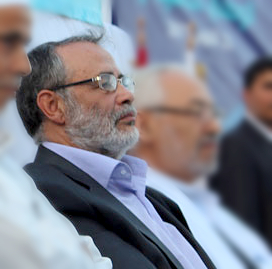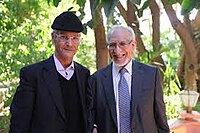
Jürgen Habermas is a German philosopher and social theorist in the tradition of critical theory and pragmatism. His work addresses communicative rationality and the public sphere.
Analytic philosophy is a broad, contemporary movement or tradition within Western philosophy, especially anglophone philosophy, focused on analysis. Analytic philosophy is characterized by a clarity of prose; rigor in arguments; and making use of formal logic and mathematics, and, to a lesser degree, the natural sciences. It is further characterized by an interest in language and meaning known as the linguistic turn. It has developed several new branches of philosophy and logic, notably philosophy of language, philosophy of mathematics, philosophy of science, modern predicate logic and mathematical logic.

Islamic philosophy is philosophy that emerges from the Islamic tradition. Two terms traditionally used in the Islamic world are sometimes translated as philosophy—falsafa, which refers to philosophy as well as logic, mathematics, and physics; and Kalam, which refers to a rationalist form of Scholastic Islamic theology which includes the schools of Maturidiyah, Ashaira and Mu'tazila.
Hassan Hanafi was a professor and chaired the philosophy department at Cairo University. He was a leading authority on modern Islam.

Tadeusz Marian Kotarbiński was a Polish philosopher, logician and ethicist.
Contemporary Islamic philosophy revives some of the trends of medieval Islamic philosophy, notably the tension between Mutazilite and Asharite views of ethics in science and law, and the duty of Muslims and role of Islam in the sociology of knowledge and in forming ethical codes and legal codes, especially the fiqh and rules of jihad.
Philosophy is the study of general and fundamental problems concerning matters such as existence, knowledge, values, reason, mind, and language. It is distinguished from other ways of addressing fundamental questions by being critical and generally systematic and by its reliance on rational argument. It involves logical analysis of language and clarification of the meaning of words and concepts.

Rahman is an Arabic origin surname meaning "gracious", "King", "merciful" or "Lord" based on the triconsonantal root R-Ḥ-M. With nisba, the name becomes Rahmani, means "descendant of the gracious one" and is also used as a surname.
Religious intellectualism in Iran is a process that involves philosophers, sociologists, political scientists and cultural theorists.

Zaki Naguib Mahmoud was an Egyptian intellectual and thinker, and is considered a pioneer in modern Arabic philosophical thought. He was described by Abbas Mahmoud al-Akkad as "the philosopher of authors and author of philosophers". Mahmoud adhered to logical positivism and adopted science interpretation with social motivations to reconcile the Arab tradition with modernism. Mahmoud defines the "Arab tradition" as the configuration of techniques by which our ancestors lived, and he viewed logical positivism as the spirit of "Modernism".
Articles related to philosophy of religion include:

Eugenio Trías Sagnier was a Spanish philosopher. Critics have likened his work to Ortega y Gasset in the philosophical literature written in Spanish.

Reset Dialogues on Civilizations is an independent, non-profit, and non-partisan international association founded in 2004 by Italian journalist Giancarlo Bosetti and Nina zu Fürstenberg. It is committed to fostering research and publications on cross-cultural and international relations, cultural and religious pluralism, advancements of human rights, and the evolution of democracy in different civilizational environments.
This is a list of philosophical literature articles.
Mohammed Abed Al Jabri was one of the most known Moroccan and Arab philosophers; he taught philosophy, Arab philosophy, and Islamic thought in Mohammed V University in Rabat from the late 1960s until his retirement. He is considered one of the major philosophers and intellectual figures in the modern and contemporary Arab world. He is known for his academic project "Critique of Arab Reason", published in four volumes between the 1980s and 2000s. He published several influential books on the Arab philosophical tradition.

Abdennour Bidar is a French writer and philosopher of Islamic culture.

Mohamed Habib Marzouki is a Tunisian academic, philosopher and translator. Along with intellectual work, he involved in politics for a short time following the Jasmine revolution. Resigning only a year later, he declared his intention to step out of political work for good and count on writing to incite social change.
Abderrazak Belagrouz is an Algerian academic writer who was born on 1981. He published more than 10 books and academic research. In 2019, Belagrouz won the young author award of Sheikh Zayed Book Award for his book "The Essence of Values and the Freedom of Social Concepts".









